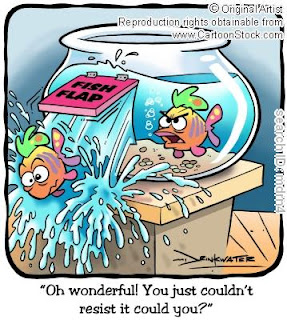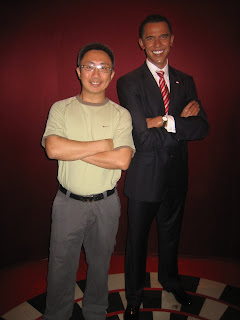Saturday, October 31, 2009
Turn the telephone into $$$
Friday, October 30, 2009
Buying magnet at trade shows
I've attended trade shows where sellers outnumbered buyers and it's a depressing sight. But worse, I've seen sellers swamped with inquiries from buyers who had no need, no budget and no buying authority, while the real prospects walked right by.
I have learnt to turn my booth/stand into a magnet for qualified prospects with buying power before the show opens. I use a combination of these influences: obligation, habit, personal invitation, recommendation.
Allow me to qualify this: many companies use traffic and activity as their measure of success and do everything they can to make sure they have lots of traffic in their booths. Lots of traffic doesn't mean the show is a success, and light traffic doesn't mean it's a failure. I'd rather have 10 people who walk to my booth and place bookings instead of 100 who only want brochures.
from right: David, Shirley, Francis (seated), Ernie
Thursday, October 29, 2009
Curiosity killed the cat?
My facebook account has been compromised. All because I receivd a message from a friends with a link and out of curiosity, I clicked through the broken link.
The curious child can sometimes be a handful, taxing even the most patient parents. However, there is usually a substantial payoff for this restless curiosity
Curious, creative employees often provide their employers more challenges, sometimes translated as difficulties. However, the inquisitive ones also offer greater opportunities for success.
I tend not to just play it safe. I tend to constantly explore the possibilities and test the limits in my work.
Wednesday, October 28, 2009
TRAC

Tuesday, October 27, 2009
Looking "good" to others
"Face is very important," Pak Tedjo said to me prior to the opening of TTC in Jakarta.
It relates to pride, opinion, appreciation. It embraces emotional tie-ins to loneliness, popularity and the way we appear "in the eyes of others."
Looking "good" to others is important to us.
It makes people falsify inner facts by outer expressions and appearances. These may include name-dropping,exaggeration, showing off, imaginary adventures and living beyond one's means.
I found out that if you want to be better-liked by them, show them you ARE impressed by their words, actions or possessions.
It's as simple as that.
Monday, October 26, 2009
Encouraging mavericks
I try to encourage mavericks, people with a little rebellion in their souls. Those kinds of people seem to do well.
My very best managers/leaders/salespeople rarely do everything by the numbers but they get the job done better than anyone who dots the i, because they're creative and determined.
Sunday, October 25, 2009
Get the best people
"I always say," Michael stated on the phone. "Talk is free."
"Plans are nice...but money talks," a consultant friend of mine once said. How right they both are.
Lots of companies are long on talk.
Regardless of the intentions expressed in business plans, where we put our key people and money is the direction in which our companies are going to move.
I am convinced we should invest resources for tomorrow. Get the best people.
Individuals are not created equal. They are talented people and not-so-talented people. Too many leaders "settle" for less than the best people.
I don't. I get the best people. That's a prerequisite for the success of our tomorrow.
from left: Shirley, Simon, Jerry, Roanna, Chloe
Friday, October 23, 2009
Law of Large Numbers
This is the Law of Large Numbers: The more people you see, the better your chances of securing a commitment.
So, don't make excuses. Make appointments.
Making good things happen is not a question of good luck or bad luck. If you don't have an effective strategy for getting in front of people, you lose.
with Helen
Wednesday, October 21, 2009
Buyers are people
"Let the Business Commence!" That's the headlines of Raimund Hosch's (CEO Messe Berlin) notes in the programme for ITB Asia. "I urge all exhibitors and buyers to engage fully with each other to make ITB Asia 2009 another huge success."
I'll tell you a secret if you don't already know it.
All prospects and customers look different. They come in various sizes, ages and shapes. Each has his/her own distinctive personality. But they are all people - and people are all pretty much alike.
Here's one main point to remember: Everybody's interested in himself. His benefit. His satisfaction. His profit.
We sales pros don't sell products - we sell the results.
From left: Yam Seng, Peter, Ernie, David, Rae
From right: Francis, Shirley, Wayne, Ivy
Monday, October 19, 2009
I pay attention to body language
In the business world , body language and nonverbal behaviours are extremely important to nearly every interaction. They influence negotiations, job interviews and the overall success of business endeavours.
Wouldn't it be amazing to have a videotape of ourselves throughout the day? That way, we can go back and see ourselves the way others see us rather than the way we think they see us.
I am conscious about paying attention to what my body language is saying and always try to choose nonverbal behaviours what are consistent with my words.
from left: Mufri, Darwin, Let, TiTin
Saturday, October 17, 2009
Protecting the Top 20%
Wednesday, October 14, 2009
Sense of urgency
"More than a quarter of the staff at the Singapore office of private bank RBS Coutts have quit in a mass resignation and some are joining Swiss rival BSI. The RBS Coutts spokesman said the bank plans to hire 200 more staff in Asia over the next five years and aims to double its assets in the same period." Saeed Azhar reported for Reuters.
During the past 20 over years, I've hired quite a lot of people and have supervised the hiring of many others. Along the way, I've hired some doozies, made some mistakes, and have hopefully learned some valuable lessons.
One of the most important lessons is that if you hire employees and it turns out they aren't moving as fast as you need them to move, there are only 2 possibilities: there are too many speed bumps or you hired a turtle.
Unfortunately, when most managers realise they've hired a turtle, they have a tendency to defend their selection because their ego can't handle admitting mistakes. It becomes a face issue.
My entire work culture is built around being fast. If one doesn't like speed, then they can't work with me. I can't be fast to market a new product, close a deal unless I am surrounded with people who move with a sense of urgency in everything they do.
From right: Shirley and Rae
Tuesday, October 13, 2009
The national pastime
"World may end in 2012: Doomsayers" This headlines on the Yahoo homepage jumped out of the PC screen and grabbed me.
Most people are better at the doomsday thinking than they are at contingency planning. Worrying - not football - is really the national pastime.
Worry starts with the words what if. For example: "What if I don't meet the budget." The trick is to shift the anxiety to anticipation with if...then. For example: :If I don't meet the budget then I will..."
I find that changing worry to preparation is empowering. It frees us the negative energy and makes it available to create opportunity. It also increases confidence. I'm less worried because I have a fall-back strategy.
Monday, October 12, 2009
Making eyes




Sunday, October 11, 2009
Show of confidence
Friday, October 9, 2009
Passion at work
"Paul is a very passionate salesperson," Virginie introduced me to Karen and Anthony Jepson. "We noticed the passion he has for the job and his product," Anthony replied. "Unlike most other salespeople who would just show us and ramble about the rooms, meeting facilities, etc. After all, a room is a room is a room."
If we try to sell something we don't believe in, people have a good reason to suspect a scam. We must believe that we are performing a valuable public service and meeting genuine human needs.
The 1st time we talk with a particular buyer, we're the remotest strangers. As a stranger, our ethics are in question. Never, ever, do anything to cast doubts on your honesty or fairness. For that reason, never "wing it" in response to a question. A better approach is "I don't knw the answer, but I will find out and get back to you."
Thursday, October 8, 2009
1st impressions...
It has been said before - it is worth repeating: You don't get a 2nd chance to make a 1st impression.
1st impressions are strong and lasting ones. But customers aren't the only people who get fast and firm 1st impressions, so do employees.
What is the 1st impression that most new employees get on that 1st day of work? Well, almost 1 in 10 just go to work and get to work. Some are treated like parts in a machine. They are given varying degrees of information which includes an official welcome, statements of missions and values, explanations of benefits and policies, paperwork processing and perhaps a code of ethics along with a menu of penalties that code violaters might expect.
I prefer to keep it fluid and personal.
Wednesday, October 7, 2009
There is no box
"The world is one great big giant box," Ernie commented in the middle of the networking event at Intercontinental. "You have to think outside the box," Francis retorted. "Leave the box. Step outside the box. That's how you can have creative problem solving."
My leadership approach focuses on empowering and enabling others to perform on their own and to the best o their ability. In a sense, the only real bosses for employees are themselves.
However, it must be said that not all people function well under such a system.
I believe that all people have it within themselves to be creative. I encourage everyone to get involved and experiment with new ideas. I am proud to report that some of our outstanding results came from ideas of team members who came up with a different idea and had the encouragement and freedom to follow through
Tuesday, October 6, 2009
VOC
"Frankly, your rates of THB3000 is a bit too high," David pointed out to Yim. "It's between you and the hotel near the Bangkok Convention Centre."
"Tell me what I have to do," Yim replied.
That's the measure of a leader who listens to the VOC (voice of the customer)
"We don't need customers telling us how to run our business" - that's the single worst aspect of excessive loyalty to a company mission. It prevents leaders from hearing what their customers are trying to tell them.
Once leaders get into this frame of mind, they tend to assume that whatever customers want is whatever the company has to offer.
In my MBA studies, I'd realised a lot of big names when down that road.
Motorola kept asserting that analog phones werethe best product
Starbucks argued that their high-quality dark-roasted coffee did not taste as good when customers asked for skim milk in their coffee.
Johnson & Johnson lost its 90% market share in its stent business.
I'm never arrogant. I respect and listen to customer's ideas and complains. I am conscious that I do not develop a "I-am-an-expert" mindset.
From left: Rosanna, Cherrie, Ernie
Monday, October 5, 2009
Accept yourself
Liking ourselves is essential to a healthy love of self which is the basis for loving others. How can we love others when we can't love ourselves?
The turning point in my life has been when I'd accepted what has been given to me. It may not be as much as I'd might like to see, but my growth started when I accepted what I have and where I was starting from.
Sunday, October 4, 2009
Getting everyone on the same page
In these dynamic and competitive times, it is easy for leaders to feel overwhelmed and perhaps even begin to despair. Modern leaders are being paid to get results and their approach to leading people is critical in any effort to improve performance.
Michael Jordan described it well: "get everyone on the same page"
Focus is critical. The reason is everyone should be able to see the big picture and understand what actions are most important for success. Without focused leadership, getting results becomes difficult if not impossible. In the words of one of my shi-fu (master), "If you are in charge of any group and you want to get things done, then you'd better get everybody singing the same song, or the music you make will be a funeral march."
Saturday, October 3, 2009
Tenacity and creativity

Friday, October 2, 2009
People who feel better act better
This is a known fact: When a person greets everyone with a smile and a compliment, people smile back and like that person. When a person doesn't greet anyone, looks at the floor as he walks around, never smiles, doesn't make eye contact with other people, people do not smile back and do not like that person.
Another fact: people who feel better act better
I self-stimulate positive feelings within myself because I am a firm believer that enthusiasm can help counteract tough times. When my customers and colleagues see my joy and vigour, they will want to be around me and do business with me.

Thursday, October 1, 2009
Let your children grow - don't be overprotective
I read this somewhere: The need to be loved, to feel important can very often, even when we are not aware of it, have a profound influence on our dealings with others. For example, if we wish to feel important, we may seek to lord it over others, to dominate them.
Very often when mothers and fathers are overprotective of their children, on the grounds that they wish no harm to come to them, they may well be subconsciously transferring their own need to have their children dependent upon them. They do not want their children to grow up.


















